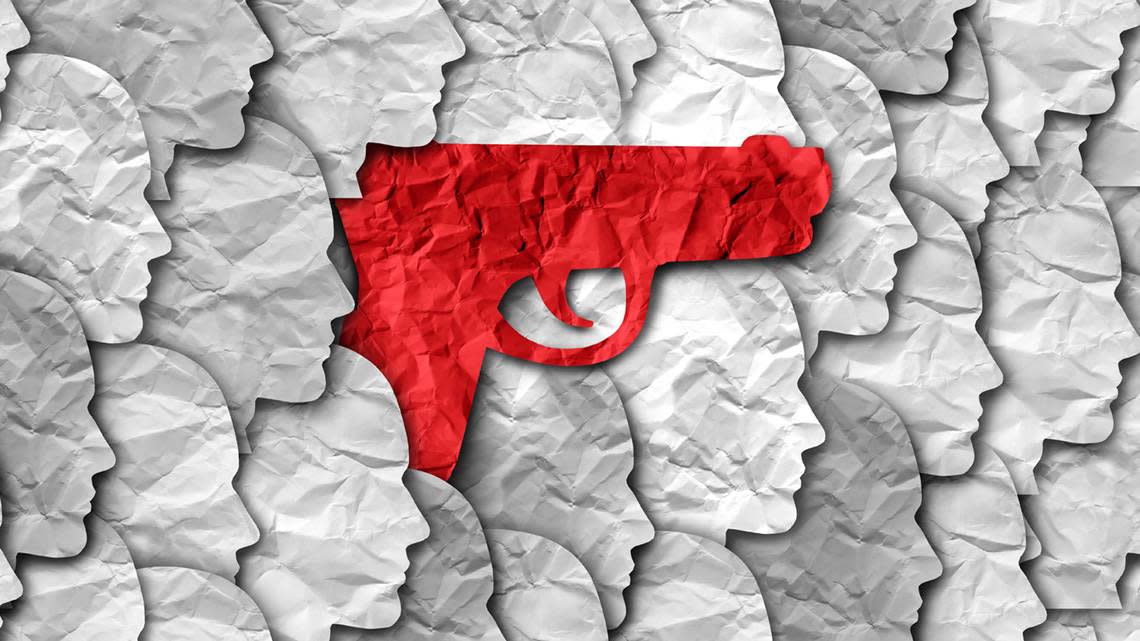With another shooting, this is no time for Missouri to let more guns in public places | Opinion

As medical students living and working in Kansas City, we are concerned about House Bill 1708, proposed by state Rep. Adam Schnelting, which seeks to restrict church leaders from banning concealed carry firearms in places of worship. The legislation would also allow firearms on public transportation and would allow 18-year-olds to carry concealed guns. This would aggravate disparities in underprivileged communities, as gun violence increases proportionally with loosened gun restrictions. As two medical students learning within a safety net hospital system, we see firsthand the inequality that politicians turn a blind eye to.
On Feb. 2, we all received a school-wide electronic group notification informing us of an active shooter in our emergency department. That morning, both of us felt unique colors of pain, fear, and sadness. While the faculty continued to lecture, we know that several of our peers experienced the same whirlwind of disbelief. Some students chatted frantically in the back of the class, while others gazed with glassy eyes toward the front of the lecture hall.
The faculty members were used to this — they had worked several years in this city. Sadly, after several minutes, we all seemed to zone back into discussions of cardiac pathologies and lose our previous innocence to the danger of firearms on campus. Our group chat discussion ended with, “I’m so glad you are OK.”
Our weekly experiences in outpatient clinics continue this persistent numbness. We saw one patient with signs of cardiogenic shock refuse to go to the emergency room during a clinic visit. When pressed about the issue, the patient said that they did not want to miss the annual remembrance ceremony of their child, who had been shot to death. A shadowing experience through the University Health surgery department continued this trend as we saw patients paralyzed from gunshot wounds to the spine and others unable to breathe without mechanical aid after being shot in the neck.
We recognize that injury due to firearms is more than just a crime. It’s an American epidemic. Firearm injury is the No. 1 cause of death for American children and teens. In Missouri, 1,351 people die and 2,312 are wounded by guns in an average year, according to the 501(c)(3) nonprofit Everytown for Gun Safety. This makes Missouri the state with the eighth-highest rate of gun violence in the United States.
The symptoms of this epidemic are felt constantly in Kansas City. One eyewitness from the Crown Center mass shooting on Jan. 17 is calling Kansas City by a new name: Killer City. Six people were injured as an assailant opened fire in the shopping center’s food court. And then, another mass shooting marred what should have been pure joy at Feb. 14’s Super Bowl victory rally for the Chiefs at Union Station.
When our elected representatives turned a blind eye as those violent events unfolded, our medical staff, our police and our emergency service technicians did not.
Students now consider these events commonplace as people throughout Kansas City report active shooters at their apartments, gunshots heard from their rooms, and bodies in backyards. As the trauma follows us inside and outside our clinic, medical practitioners in the city are forced to ask serious questions about our state’s gun policies.
Laws should follow the evidence
In medical school, we are taught to question standards of care to maximize evidence-based practices in our decision-making. Research shows that laws improving background checks when purchasing a gun, laws that allow families to petition courts to prevent patients in crisis from purchasing firearms, restricting permitless carrying, and secure gun storage requirements all decrease gun violence.
For our lawmakers to oppose bills such as H.B. 1708 would be the beginning of an evidence-based therapy for the gun violence epidemic in Kansas City. Policies like this bill have a direct impact on the problem. For example, a recent article in the American Medical Association’s JAMA Network Open found that the 2017 Missouri policy to allow permitless carry increased young adult firearm-related suicides by 21.8%. Another study found that the 2010 repeal of the permit-to-purchase laws increased firearm-related homicide by 23%. How would these statistics continue to worsen with H.B. 1708?
Medical students, doctors and the people of Kansas City have the opportunity to address this public health crisis together. We are calling on everyone to stand with our medical vow: to do good and to do no harm. Every resident of our gorgeous city should stand with our neighbors and make our communities safer.
Medical trainees know this firearm epidemic will end by one cure alone: if every member of the Missouri General Assembly stood against bills like H.B. 1708 and stood to love their neighbor as themselves. We believe that Kansas City is the city of kindness. We are the concerted effort against the firearm epidemic. By opposing this legislation, you are taking the first step toward a citywide cure. Will you stand with us?
Samuel Kim is a first-year medical student at the University of Missouri-Kansas City. He is a founder of an anti-gun violence organization chapter at the School of Medicine. He is an active Christian who believes that peace in Kansas City is achievable only by valuing your neighbor over yourself. He co-authored this with Audrey Yu, a second-year medical student at the University of Missouri School of Medicine. During her medical school journey and time in Kansas City, she found a passion for gun violence advocacy. She continues to strive and advocate for policies against gun violence.


